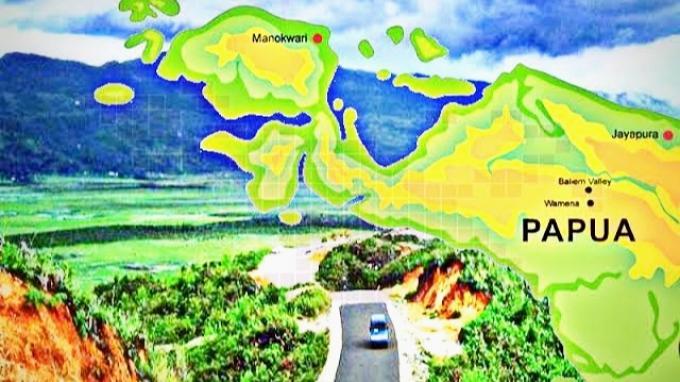Supporting the Implementation of Positive Laws for the Progress of Papua
By: Markus Rebekah Ohei *)
Every country in the world has a legal system to regulate its citizens. The legal system of each country has its own differences. The state law that is applied can be called the nation’s national law. National laws are formed based on the cultural characteristics of each nation because national laws are actually the result of values that grow as a reflection of national culture.
In Indonesia, customary law is law that reflects the nation’s culture because it grows from community habits over time. Even though they are all part of the Republic of Indonesia, there are differences in the customs of each region. All these customs can be united with the motto Bhinneka Tunggal Ika, namely different but still one.
In this regard, customary law as living law in Indonesia is in line with the school popularized by Eugen Ehrlich. This opinion was popularized as the term Sociological Jurisprudence. This school focuses on living law, which is law that develops and lives in society. According to him, positive law can work well and effectively if its formation is based on the living laws that exist in that society.
Talking about customary law, Papua is one of the regions that is very strong in the implementation of customary law in its territory. The government also recognizes and strengthens Papuan customary law communities within the framework of special autonomy. It should be noted that the Papuan customary law community is one of the 19 customary law communities in Indonesia.
The Special Autonomy Law (UU Special Autonomy) for Papua seeks to recognize, accommodate and respect the existence of customary law communities in Papua. As explained in Article 1 of the Special Autonomy Law which contains various definitions related to custom, such as traditional communities, customary law, customary law communities, customary rights, and indigenous Papuans.
Recognition of indigenous peoples in the Special Autonomy Law is realized in several ways. First, the formation of the Papuan People’s Council (MRP) as the cultural representation of indigenous Papuans. Second, there are DPRD members from the appointment line who are selected based on traditional areas. Third, the use of natural resources that respects the rights of indigenous peoples. Fourth, development that provides broad opportunities for indigenous communities. Fifth, recognition of customary rights and individual rights of indigenous peoples, as well as recognition of customary justice in certain customary law communities.
However, there are times when Papuan customary law finds it difficult to resolve a number of conflicts. So that positive law that applies nationally must remain present in regulating the lives of Papuan people, especially social life. In fact, a number of Papuan figures have asked that positive law be normalized in the Papua region in order to resolve the conflict so that it does not drag on and repeat itself. Like the conflict between residents that occurred in Timika, the Papuan Traditional Council is urging that it be resolved through positive law, not customary law.
Member of the Papuan Traditional Council, George Weyasu, emphasized that traditional solutions were not effective in stopping the problem because conflicts had continued to recur over the last four years. George said that the number of victims was very large and almost happened every year, so it was hoped that conflicts would no longer occur and positive laws would be enforced. Apart from that, the importance of legal action is to create a deterrent effect and prevent future riots.
Previously, the joint TNI/Polri apparatus deployed around 800 personnel to arrest suspects in the Timika conflict. The joint forces are looking for Waimum or warlords in local language, perpetrators of war and perpetrators of criminal acts. The search will be carried out over the next 7 days at four points and the operation will be extended if the two parties do not reach an agreement. The Papuan Traditional Council hopes that a positive legal approach can provide a long-term solution that is effective and fair for all parties involved in the conflict in Timika.
Several years ago, Klemen Tinal, who served as Deputy Governor of Papua Province, 3 years before he died, also emphasized that positive law must be enforced on Earth of Cendrawasih in order to create conditions that are safe, peaceful and free from various security disturbances. He conveyed this in response to the OPM shooting of dozens of infrastructure project workers in Nduga Regency, Papua, in 2018.
As the provincial government representing the central government, Klemen Tinal stated that the incident was a humanitarian tragedy that no one wanted. Klemen asked security forces from the police and TNI to immediately take firm action, so that parties suspected of being involved could be processed according to applicable legal regulations. Therefore, positive law must be enforced in Papua, because Indonesia is a country of law.
Positive law is the foundation that maintains order and justice in society. Through various rules established by official authorities, positive law provides a clear framework for citizen behavior, protects individual rights, and ensures that justice is served. Therefore, understanding and respecting positive law is important for every citizen to create a harmonious and just society. However, it is important to remember that positive law must be in line with the traditional values that live in society in order to be accepted and effective. A balance between positive law and customary law is the key to achieving true and sustainable justice in a plural and dynamic society like Papua.
)* Legal expert from Papua
